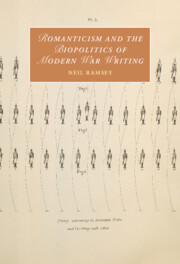Book contents
- Romanticism and the Biopolitics of Modern War Writing
- Cambridge Studies in Romanticism
- Romanticism and the Biopolitics of Modern War Writing
- Copyright page
- Contents
- Acknowledgements
- Introduction
- 1 Writing and the Disciplinarisation of Military Knowledge
- 2 Strategy in the Age of History
- 3 Robert Jackson’s Medicalisation of Military Discipline
- 4 More a Poet than a Statesman
- 5 Thomas Hamilton’s Wordsworthian Novel of War
- Afterword
- Bibliography
- Index
- Cambridge Studies in Romanticism
1 - Writing and the Disciplinarisation of Military Knowledge
Published online by Cambridge University Press: 25 April 2023
- Romanticism and the Biopolitics of Modern War Writing
- Cambridge Studies in Romanticism
- Romanticism and the Biopolitics of Modern War Writing
- Copyright page
- Contents
- Acknowledgements
- Introduction
- 1 Writing and the Disciplinarisation of Military Knowledge
- 2 Strategy in the Age of History
- 3 Robert Jackson’s Medicalisation of Military Discipline
- 4 More a Poet than a Statesman
- 5 Thomas Hamilton’s Wordsworthian Novel of War
- Afterword
- Bibliography
- Index
- Cambridge Studies in Romanticism
Summary
Chapter 1 outlines the growth of military writing in Britain during the Romantic period. It does so by situating this growth in relation to the extensive expansion of print of the late eighteenth century, in particular the expansion of periodical writing. Seeking to develop an intellectual culture out of the increasingly daily experience of wartime, the military journals played a foundational role in the formation of a new kind of deep but narrow field of military disciplinary knowledge. The appearance of military journals reflects how knowledge in this era was undergoing what Michel Foucault terms a process of ‘disciplinarization’, as the localised and fragmentary forms of earlier technical knowledges were variously disqualified or else centralised, normalised and hierarchicised into a set of modern disciplinary fields that formed the basis of modern science. This chapter also considers, however, how this disciplinarization of military knowledge gave rise to counter-histories of war’s sublime shock and brute force. Addressing the subjective side of disciplinarity, the formation of self-writing and what Ian Hacking has theorised as memoro-politics, this chapter concludes by placing literature and science as twinned elements forming the disciplinary knowledge of war.
Keywords
- Type
- Chapter
- Information
- Romanticism and the Biopolitics of Modern War Writing , pp. 23 - 72Publisher: Cambridge University PressPrint publication year: 2023

